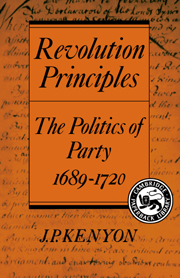Book contents
- Frontmatter
- Contents
- Preface
- Preface to the paperback edition (1990)
- 1 Introduction
- 2 By force or by miracle
- 3 The measure of submission
- 4 This skein of tangled principles
- 5 King Charles's head
- 6 The bloody flag
- 7 Revolution Principles
- 8 Black and odious colours
- 9 The four last years
- 10 That triumphant appellation
- 11 Conclusion
- Appendix
- Abbreviations
- Notes
- Addendum
- Index
2 - By force or by miracle
The immediate debate on the Revolution
Published online by Cambridge University Press: 07 October 2009
- Frontmatter
- Contents
- Preface
- Preface to the paperback edition (1990)
- 1 Introduction
- 2 By force or by miracle
- 3 The measure of submission
- 4 This skein of tangled principles
- 5 King Charles's head
- 6 The bloody flag
- 7 Revolution Principles
- 8 Black and odious colours
- 9 The four last years
- 10 That triumphant appellation
- 11 Conclusion
- Appendix
- Abbreviations
- Notes
- Addendum
- Index
Summary
In the next generation it was generally assumed that the Revolution of 1688 had been an act of resistance, even rebellion. Many Whigs gloried in it; most Tories condemned it. This was so axiomatic that Robert Walpole, opening the case against Sacheverell in 1710, told the Lords: ‘It cannot now be necessary to prove resistance at the Revolution; I should as well expect that your lordships would desire me to prove, for form's sake, the sun shines at noon day. Modern opinion would, I suppose, incline towards Walpole's view. But there is in fact little evidence for it, and what there is comes mostly from James II. In two proclamations, on 28 September and 6 November 1688, James accused the Prince of Orange of mounting an unprovoked invasion, and he gave his own physical danger as the sole reason for his flight in December. This continued to be Jacobite orthodoxy right down to 1715 and beyond. William himself, in his declaration of 30 September, denied any intention even of coercing James, let alone conquering him, and swore that his army was merely intended to protect his own person against the king's ‘evil counsellors’. When he read James's proclamation of 28 September, which accused him of ‘purposing an absolute conquest of these kingdoms’, he published an additional declaration, protesting that his forces were ‘utterly disproportioned to that wicked design…[even] if we were capable of intending it’.
- Type
- Chapter
- Information
- Revolution PrinciplesThe Politics of Party 1689–1720, pp. 5 - 20Publisher: Cambridge University PressPrint publication year: 1977

